| Srl | Item |
| 1 |
ID:
091963
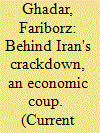

|
|
|
|
|
| Publication |
2009.
|
| Summary/Abstract |
Iran's election fraud last June, the civil unrest that followed, and the regime's continuing crackdown against dissenters have their roots in the country's poor economic condition. They are also rooted in efforts by President Mahmoud Ahmadinejad and his allies in the Islamic Revolutionary Guards Corps to grab control over large swaths of the economy.
|
|
|
|
|
|
|
|
|
|
|
|
|
|
|
|
| 2 |
ID:
107582
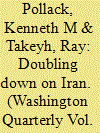

|
|
|
| 3 |
ID:
104447
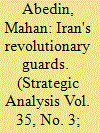

|
|
|
| 4 |
ID:
150960
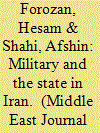

|
|
|
|
|
| Summary/Abstract |
The Islamic Revolutionary Guard Corps (IRGC) is a multilayered political, ideological, and security institution that has steadily acquired an increasing role in Iran's economy in recent years. This article analyzes the growing economic and business involvement of the IRGC in the broader context of Iranian statesociety relations in general, and its civil-military dynamics in particular. More specifically, we look at the political and socioeconomic processes within which the IRGC operates at the interrelated levels of the state and society. This analysis sets out the framework based on which we examine the IRGC's increasing power in the course of its engagements and various conflicts in both political and societal arenas, in particular its economic expansion under Mahmud Ahmadinejad's presidency. This article concludes by discussing the implications of the IRGC's rise on the economic policy of the government under President Hassan Rouhani.
|
|
|
|
|
|
|
|
|
|
|
|
|
|
|
|
| 5 |
ID:
159223


|
|
|
|
|
| Summary/Abstract |
The objective of this study is to understand the shift in the nuclear policy of the Islamic Republic Revolutionary Guards (IRGC). As a military organization considered to be the steward of the nuclear programme, the Revolutionary Guards turned into spoilers on the few occasions when the pragmatists in Iran tried to negotiate a deal with the international community. In a surprising shift, the Guards’ nuclear policy changed and supported nuclear negotiations and the nuclear agreement. It is assumed that the IRGC is more interested in its economic ventures than in promoting the nuclear project. To test the hypothesis, the present study is designed to provide a rigorous empirical examination of the economic impact of the sanctions on the Revolutionary Guards.
|
|
|
|
|
|
|
|
|
|
|
|
|
|
|
|
| 6 |
ID:
125214
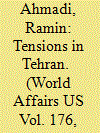

|
|
|
|
|
| Publication |
2013.
|
| Summary/Abstract |
In its first days under the Ayatollah Khomeini, the Islamic Republic of Iran was a competitive authoritarian state that, despite challenges of war, armed opposition, and difficult economic times, enjoyed a significant measure of stability. The Revolutionary Guards and paramilitary Basij force were charged with controlling the disenfranchised masses. But Khomeini understood the importance of allowing at least two factions of the political elite to compete for power and the control of policy. The leftist clergy, organized as the Association of Militant Clerics (Majmae Rohaniyoone Mobarez), and their allies advocated for a state-run economy and trade, while the rightist clergy, organized as the Society of Militant Clerics (Jamae Rohanyete Mobarez), and their financially powerful merchants (Bazaris), campaigned for privatization and free-market economy. Both groups developed extensive, mafia-like networks and both sought to establish a crony-run economy that benefited allies and members of their clan.
|
|
|
|
|
|
|
|
|
|
|
|
|
|
|
|